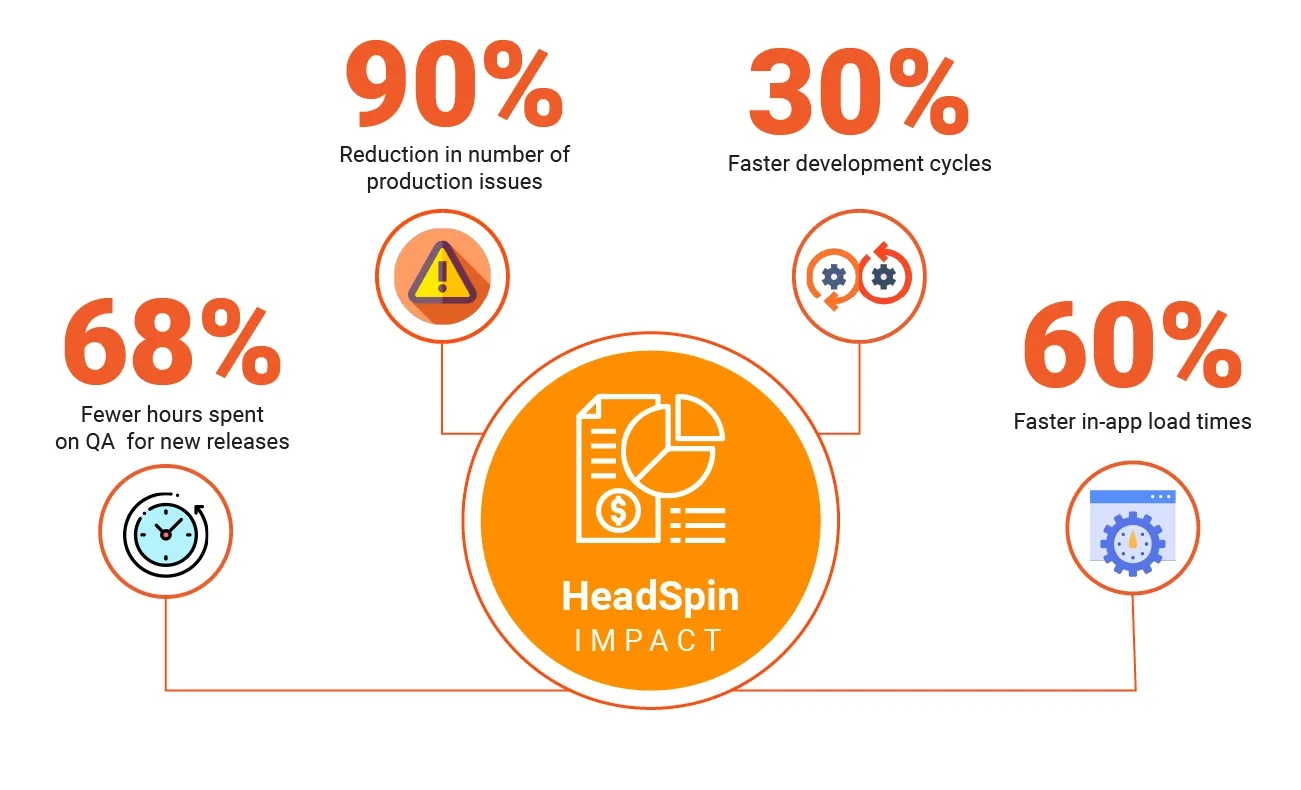Why choose HeadSpin over Sauce Labs?
Looking to offer the best digital experience for your users?
Enterprise testing solutions such as HeadSpin and Sauce Labs have been relentlessly offering varied testing services fulfilling customer demands for testing on different platforms. Both of their testing capabilities on real devices add value to businesses, thereby providing them with the ultimate testing solutions. Here, we will show you some features that HeadSpin offers, making it a great Sauce Labs alternative.
Your wait for the perfect testing partner ends with us at HeadSpin.

%20(1).jpg)
Remote Mobile & Browser Testing
With HeadSpin’s unique global device infrastructure, you can test and debug mobile and web applications for thousands of devices across the world connected to carrier networks. Its specialized location testing in different time zones makes it a preferable Sauce Labs alternative.
Its remote access function lets you debug mobile and browser apps on real devices from your desktop or mobile without an SDK.
HeadSpin enables automation testing on real Android and iOS mobile devices as a part of any of its plans. In contrast, you have to purchase separate plans for different devices with Sauce Labs.
Multi-User Support for Testing
HeadSpin’s automated mobile application testing allows smooth testing of multiple parallel applications, whereas Sauce Labs does not offer multi-user support. With HeadSpin, you can perform automated or manual testing on as many iOS or Android devices concurrently without experiencing any slowdown. HeadSpin supports multiple users settings, applications, and data with which it supports a shared device experience, wherein a different person uses each device. The multi-user support is an important feature that makes HeadSpin count among the best Sauce Labs alternatives.

Supported Integrations
HeadSpin is compatible with Windows, Mac, and other testing frameworks as well. HeadSpin supports 30+ automation frameworks and seamlessly integrates with your CI/CD and testing workflows, including CircleCI, Jenkins, Jmeter, LoadRunner, PagerDuty, and many more. HeadSpin also re-uses existing scripts based on test frameworks that are familiar to you. HeadSpin seamlessly supports native Appium and Selenium, and WebDriver that acts as a bridge with additional frameworks such as Espresso, UI Automator, XCTest, etc.

Multiple Offerings
HeadSpin offers more types of testing features when compared to Sauce Labs. Sauce Labs offers benchmarking, cross-browser testing, debugging, requirements-based testing, and web testing. The testing offerings with HeadSpin are AB testing, cross-browser testing, debugging, historical reporting, in-app events tracking, load testing, mobile testing, parallel testing, parameterized testing, regression testing, and testing based on the user requirements. You can use our device cloud for easy local access or deploy the HeadSpin Appliance on-premise or hosted by 3rd parties for security and other special use-cases.

Start your free trial and experience yourself

Data Security
HeadSpin’s security testing feature offers dedicated devices to users and complete security of user data. Sauce Labs, on the other hand, does not provide security testing, which disregards the promise of the complete deletion of previous data. HeadSpin helps enterprises in perfecting digital experiences by identifying performance issues across applications, devices, and networks and provides optimum resolution for them.


User Base
The user base for HeadSpin is quite extensive and diverse. It supports 1000+ users from Enterprises, Mobile Application Developers and Testers, Web Application Developers, IOT Companies, 5G Telcos, etc. In contrast, Sauce Labs supports a user range of 1-1000 that involves Software Engineers, Software Development Engineers in Test (SDET), Quality Engineers, and Quality Assurance teams.

Testing Speed
HeadSpin values its customers’ time and offers solutions for quicker and superior testing, thereby improving the quality of applications and ultimately enhancing customer satisfaction. As a result of this, ROI is easily achieved in a quick cycle. Testers that use HeadSpin’s performance testing on Android and iOS devices have gained excellent connectivity throughout their testing, making the process smooth and easy. The Sauce Labs platform faces unexpected connection dropouts.
Artificial Intelligence(AI) Engine
Another reason why HeadSpin is the best alternative to Sauce Labs is AI. Artificial Intelligence expands the potential massively when applied to testing. It harnesses the potential of AI to analyze the performance test results and improves user experience. HeadSpin’s AI-powered issue detection works analytically to identify and prioritize issues during testing. It provides information such as long loading times or video quality drops, and issues in networks and servers.
%20Engine.png)
Real User Testing
HeadSpin offers testing in real user conditions and can run multiple parallel tests. It also provides proactive root cause analysis with real-time dashboarding. Its AI Engine comes up with actionable insights to upgrade the performance and functionality of connected experiences across different applications, devices, and networks. Additionally, it also offers 1000s of metrics with beautiful visualizations. HeadSpin supports API for importing and exporting data, unlike Sauce Labs.
.jpg)
Reference-free Video MOS
HeadSpin measures the holistic, subjective quality of videos rated by users without depending on other metrics for the results. It is a tedious task where Sauce Labs fails. In contrast, HeadSpin is way ahead. It offers reference-free video Mean Opinion Score (MOS) that gives an accurately scalable algorithm for overcoming video quality challenges.

Enterprise-Grade Appliance
The HeadSpin Appliance contains real SIM-enabled devices with full RF access and security features to local Wi-Fi or carrier networks. It is temperature-controlled for ensuring perfect device stability and preventing burnouts. The enclosure for the HeadSpin appliance is secure and is portable for various compatible devices. It also offers deployment, which is enterprise-grade for both portable and on-premise devices. Sauce Labs is far limited in its scope when it comes to Appliance Support compared to HeadSpin.
.jpg)
To summarize, considering all the parameters, HeadSpin has much more value to offer to your testing efforts as compared to Sauce Labs and other alternatives.
HeadSpin’s testing platform enables you to perfect digital experiences with potential pre-deployment, QA testing, and proactive issue identification in production through automated testing capabilities deployed in the cloud or on-premise.
Discover how HeadSpin can empower your business with superior testing capabilities



























.png)











.jpg)





